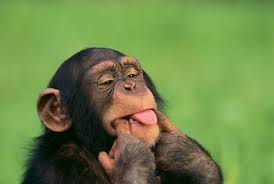Science Daily/University of Vienna, 12/9/16. "Why can't monkeys speak? Vocal anatomy is not the problem."
 |
Understand monkey,
how hard is that? |
 |
The human mutation, what is that?
Chimpanzees have good comments too. |
"Summary: Monkeys and apes are unable to learn new vocalizations, and for decades
it has been widely believed that this inability results from limitations
of their vocal anatomy: larynx, tongue and lips. But an international
team of scientists has now looked inside monkeys' vocal tracts with
x-rays, and found them to be much more flexible than thought before. The
study indicates that
the limitations that keep nonhuman primates from
speaking are in their brains, rather than their vocal anatomy."
Read more.
Related links, Science Daily, older articles,"Great Ape language".
Why Can't Monkeys and Apes Talk? - Popular Mechanics/Amber Angelle, 4/16/10, "Why can't monkeys and apes talk?" .... "The discovery yields the first evidence that human-specific
FOXP2
mutations have influence over speech. Interestingly, the mutations are
believed to have occurred around the same time that human language first
appeared. But activating a set of language genes isn't enough to create
a talking chimp--the way genes influence the brain is too complex. For
example, genes "turn on" at different times throughout human development
to coordinate the formation of parts of the brain involved with
language. "The next step is to look at the individual functions of this
set of genes," Konopka says. "They may offer insight about why we're the
only species that has the ability to speak, and may even show us how to
help people with language abnormalities."
Related current articles. Smithsonian Magazine/Ben Panko, 12/13/16, "What's really keeping monkeys from speaking their minds? Their minds." .... "On an evolutionary scale, University of Vienna biologist W. Tecumseh Fitch’s results also suggest that
the
groundwork for speech could have existed before humans even evolved—and
that it took solely the evolution of a our particular neural wiring to
take full advantage of those vocal cords."
Science Alert/David Nield, 12/12/16,"This is what monkeys would sound like if they could produce human-like speech." ...."The team also admits that 'monkey talk' might not sound anything like
human talk, but the vocal ability to shape five vowels and several
common consonants is there. To demonstrate, they developed a computer model based on the macaque
X-ray data, and used it to synthesise a few phrases if a monkey were to
say them. You can hear the rather strange results in the
sound clip where a simulated macaque rather hopefully asks, "Will you marry me?"
(and sounding a bit like a hoarse old man struggling for breath).
Science Magazine/Michael Price, 12/9/16, "Why monkeys can't talk- and what they would sound like if the could." .... "At some point
in the 8 million or so years since we diverged from
chimpanzees, our closest living evolutionary relatives, human brains
gained substantial control over the vocal tract, Fitch say.
Anthropologists who scour the fossil record for evidence of when our
hominin ancestors learned to speak are “wasting their time,” he says,
because all human ancestors had vocal anatomies capable of speech.
Instead, the field should focus on genetic factors, like the
FOXP2 gene,
known to be necessary for proper speech and language development, to figure out when humans gained the gift of gab. Dan Dediu, a psycholinguist at the Max Planck Institute for
Psycholinguistics in Nijmegen, the Netherlands, says the study’s results
open new doors for investigating modern languages, as well.
He thinks
slight population-level differences in vocal anatomy
could explain why
various languages have different phonetic and phonological properties.
“Even a monkey's vocal tract can support spoken language, but its fine
[anatomical] details might determine what sort of spoken language
actually emerges,” he says. “I might even think about adding to my
simulations a monkey vocal tract and see what one gets.”
Note photographs. Monkey left. Purple Cow Ideas Management/Susie May, 9/25/12, "Tale of the Rogue Monkey." Chimpanzee right from The Jane Goodall Institute of Canada/About Chimpanzees, Chimp behavior/diet","Chimps are omnivores and eat
not only fruits, nuts, seeds, blossoms, and leaves but many kinds of
insects and occasionally, the meat of medium-sized mammals.
Posted by Kathy Meeh


1 comment:
Was this a description of last night's love fest for Deirdre? Monkey talk!
Now that was just mean. Poor monkeys don't deserve that.
Post a Comment